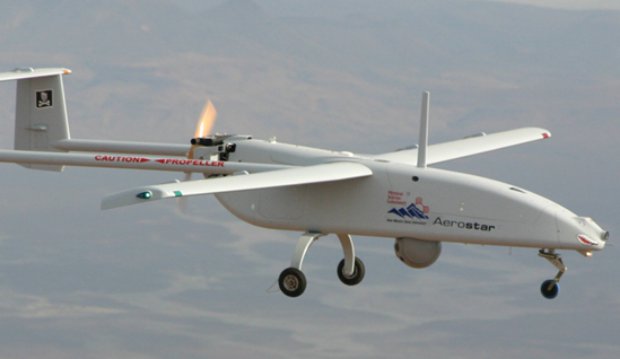The Aerostar unmanned aerial vehicles (UAVs) acquired by the Nigerian Air Force (NAF) in 2006 have reportedly been grounded due to a lack of maintenance, limiting surveillance operations against Boko Haram militants. Meanwhile the US has deployed a Predator team to Chad to search for kidnapped Nigerian schoolgirls.The nine Aerostar UAVs were acquired in 2006 and 2007 from Aeronautics Defense Systems (ADS), a company based in the Israeli capital Tel Aviv in a contract which also included the supply of unmanned patrol boats to the Nigerian Navy, bringing the net value of the contract to $260 million.
Israeli newspaper Haaretz quoted ADS marketing officer Tsur Dvir and military and diplomatic sources as saying that the Nigerian UAVs became inoperable five year ago due to poor maintenance.
“To the best of our knowledge, these systems aren’t operational. We did receive an inquiry from them (Nigerian Air Force) about spare parts, but it never turned into a deal. I wish it had but now the drones are probably parked in a yard somewhere,” Dvir said.
He added that the UAVs, which are equipped with Controp advanced optical payloads, would have been the best tools to deploy in the international search for over 200 Nigerian schoolgirls who were abducted by Boko Haram militants five weeks ago because they have thermal imaging cameras suitable for night operations.The Aerostars were initially supposed to be used in surveillance operations over oil and gas installations in the Niger Delta which were being targeted by militants and kidnap gangs. However, the UAVs never flew in this role following the 2008 amnesty which led to a cessation of hostilities in the Niger Delta.
Concerns over Nigeria’s intelligence, surveillance and reconnaissance (ISR) capabilities have mounted of late amid revelations that the country’s first indigenous UAV, the Gulma, which was unveiled by President Goodluck Jonathan in December last year, has also been grounded due to mechanical problems.
Although the military has refused comment on the current state of its UAV fleet, former Nigeria Chief of the Air Staff Air Marshal Alex Badeh said the Aerostar UAVs were grounded in 2009 due to what he described as ‘vendor-related problems.’ By the end of 2013, Nigeria had 15 trained UAV pilots and was working on a second indigenously built UAV. Last December, Nigeria also unveiled a locally made drone at an air force base in Kaduna, although it has not flown since.
Strategic military analysts say the lack of operational UAVs and other ISR assets has degraded Nigerian military’s capacity to confront and contain the Boko Haram insurgency.
Dvir did not say how many Aerostars were bought by Nigeria. Nigeria’s defense spokesman could not immediately be reached for comment.The former attache said the deal was struck in 2006, with a view to deploying the drones in the oil-producing Niger Delta, where militants were attacking crude pipelines and kidnapping oil workers before an amnesty three years later. They never flew.
A government adviser said the Israeli drones were among many procurements that quickly went obsolete owing to lack of maintenance.
Neither source, nor the company, knew how many had been bought, but an aerospace industry source said they each would have been worth between $15 million and $17 million.
Sources: Israel Hayom ; Defence Web

